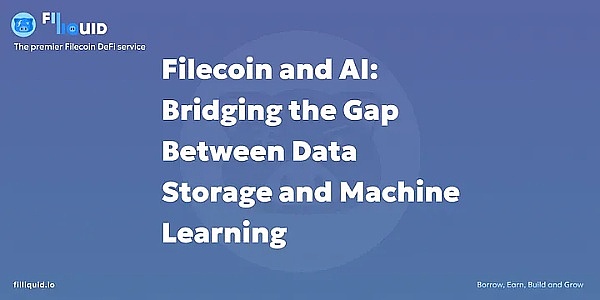Author: 0xmonomi
According to the latest data, as of March 2024, the price of Filecoin has soared 70% since the beginning of February, reaching a new high since 2024, exceeding $8.50. This performance not only brings it close to its 2023 high, but also sets a new record. This series of positive events has once again sparked strong interest in Filecoin and decentralized storage.
As the leading project in the field of DePIN (Decentralized Physical Infrastructure Networks), Filecoin is widely regarded as an important infrastructure project in the artificial intelligence industry. Its protocol was originally proposed in 2014 to promote the development of the decentralized storage market as part of the Interstellar File System (IPFS). The Filecoin network provides a decentralized market for file retrieval and storage through its node network, supported by a new blockchain, and users use the native cryptocurrency FIL for transactions.
In February, a series of positive events drove the surge in Filecoin prices. First, OpenAI demonstrated its Sora technology, reigniting interest in the field of artificial intelligence. Collaborations with well-known industry players such as Solana and Binance further boosted prices. During this period, Filecoin climbed from a low of $4.85 at the beginning of the month to a high of $8.88, an increase of 82%.
As of March, Filecoin's price performance has investors full of expectations for its future. So, how can Filecoin continue to maintain its leading position in a highly competitive market? Next, we will explore in detail the future development direction of Filecoin and its position in the decentralized storage market.
Providing multiple storage solutions: Filecoin is emerging in the decentralized market
Blockchain-based storage and data retrieval:
Filecoin is an open source public cryptocurrency and digital payment system that aims to provide blockchain-based cooperative digital storage and data retrieval services. Developed by Protocol Labs, Filecoin shares some of the ideas of the Interplanetary File System (IPFS), allowing users to rent unused hard drive space and using blockchain mechanisms to record transactions. Filecoin's open protocol is supported by blockchain, and transactions are conducted using the local cryptocurrency FIL, using proof of replication and proof of space and time technology to ensure the security and reliability of data.
Multi-party support and application expansion:
In a recent episode of the Empire podcast, Kyle Samani and Tushar Jain, founding partners of MultiCoin Capital, expressed their optimism about Filecoin. They believe that Filecoin has developed into a meaningful ecosystem comparable to Ethereum and Solana. The launch of the Filecoin Virtual Machine (FVM) introduces programmable payments for storage, retrieval, bandwidth, and computing, giving Filecoin greater flexibility and more application scenarios. For example, FVM can support new applications in areas such as liquidity pledge, perpetual storage, and decentralized computing, further enhancing Filecoin's market competitiveness.
Growing network utilization:
Filecoin's hardware market is developing rapidly, and the first service is storage. Through a pricing structure based on the provider market, Filecoin enables flexible storage transaction pricing, where users pay storage providers to store data for a specified period. According to Messari's report, in the first quarter of 2024, Filecoin stored nearly 1900 PiB of data on its network, an increase of 9% from the fourth quarter of 2023 and more than three times from the first quarter of 2023. Despite the decline in new daily transactions, Filecoin's storage utilization rate increased to nearly 23% in the first quarter of 2024, showing a steady increase in market demand.

In summary, Filecoin is steadily developing into a leader in decentralized storage through its innovative technology and strong market positioning. With the continuous advancement of technology and the increase in market demand, Filecoin's future prospects are very bright. Next, we will explore the development potential and challenges faced by Filecoin in the future.
Discuss Filecoin's technical advantages and AI application scenarios: efficient and secure decentralized storage solutions
As a decentralized storage solution, Filecoin provides users with efficient and economical data storage services through its unique peer-to-peer cloud architecture. Filecoin's decentralized market has significant advantages in both price and security, and is particularly suitable for AI companies that require large-scale data storage. In traditional centralized storage solutions, data security and storage costs have always been two major problems faced by enterprises, and the emergence of Filecoin has effectively solved these problems.
Filecoin allows storage providers to rent out idle storage space to users who need storage solutions, and users complete transactions by paying FIL tokens. Such a mechanism not only ensures the security and scalability of data, but also ensures the honest behavior of storage providers when storing customer data through advanced cryptography technology and Filecoin's staking incentive model. Take OpenAI as an example. Although it has a huge internal storage infrastructure, Filecoin's low-cost and efficient storage solution is obviously more attractive to many small and medium-sized AI companies.

Data storage is an indispensable part of the application and development of AI technology. The training of AI models requires massive data sets, and the secure storage and efficient access to these data sets directly affect the success of AI projects. Filecoin provides a secure, scalable and distributed data storage platform through its blockchain technology to ensure the integrity and security of data. For example, when OpenAI developed its language model, it needed to store and access a large number of text data sets, which can be stored securely and economically on Filecoin.
Not only that, Filecoin also promotes data sharing and cooperation among AI companies through its decentralized architecture. The launch of the Filecoin Virtual Machine (FVM) enables developers to publish decentralized applications (dApps) to create a data market specifically for sharing AI data sets. This mechanism not only reduces the data cost of AI companies when training models, but also promotes innovation in the industry. For example, through FVM, AI companies can share image datasets used to train machine learning models, thereby reducing the cost of repeated data collection and accelerating the model development process.
Filecoin's decentralized storage architecture reduces the risks brought by centralized systems, allowing AI companies to always have control over their data and models, and avoid data access restrictions caused by regulatory intervention. This is particularly important for AI companies because the security and controllability of data are directly related to the stability and sustainability of their business.
In general, Filecoin effectively bridges the gap between data storage and machine learning through its innovative storage solutions. Its decentralized market not only provides AI companies with reliable and scalable data storage services, but also promotes the development of AI technology by promoting data sharing and cooperation. As the AI industry continues to grow, Filecoin's application prospects in it will be broader, bringing more possibilities and opportunities to AI companies.
Is the future of Filecoin bright? Despite a strong start to 2024, challenges cannot be ignored
In summary, Filecoin has had a strong start in 2024, with the liquidity leasing protocol Glif receiving a $4.5 million seed round of financing, injecting new vitality into its ecosystem. Through Glif's innovative model, FIL token holders are able to earn returns by depositing tokens, improving Filecoin's capital efficiency. However, despite the promising prospects, the risks facing Filecoin cannot be ignored.
First, although the decentralized storage market has shown great potential, its competition is also intensifying. Filecoin's decentralized storage architecture provides an ideal storage solution for AI companies, but the fierce competition in this market may pose a challenge to Filecoin's continued growth. As more storage solutions emerge, Filecoin needs to continue to innovate to maintain its competitive advantage.
Second, Filecoin's ecosystem has recently encountered negative events. Team members of STFIL Protocol, a liquid pledge protocol in the Filecoin ecosystem, were detained by Chinese police on suspicion of criminal activities such as money laundering. This incident exposed the vulnerability of decentralized systems in the face of laws and regulations. After STFIL's core technical team was detained, 2.56 million FIL in its protocol were transferred to an unknown external address, which not only damaged users' trust, but also raised questions about the security of decentralized storage platforms.
Finally, although Filecoin's innovation in technology and market applications has demonstrated its great potential, it is also facing uncertainty. How to meet legal and regulatory requirements while maintaining decentralization and security will be a problem that Filecoin and its ecosystem need to explore and solve in the long term. Although Filecoin's future is full of hope, it will inevitably experience twists and turns and tests. It is in such uncertainty that Filecoin will continue to seek balance and breakthroughs to meet future opportunities and challenges.
In summary, when users participate in the Filecoin ecosystem and its related projects, they need to be sensitive to the overall market and segments, and understand the details in the ecosystem from multiple dimensions to help make more informed decisions.
 JinseFinance
JinseFinance





